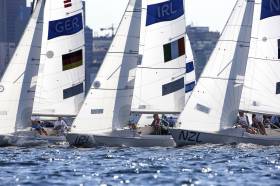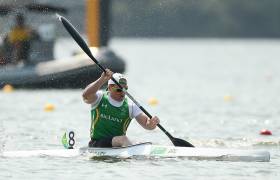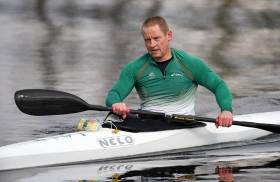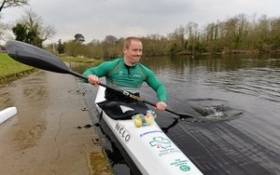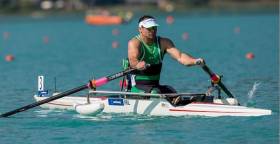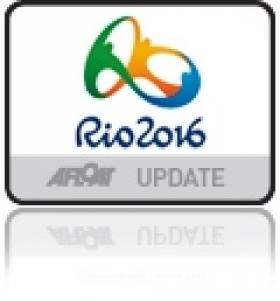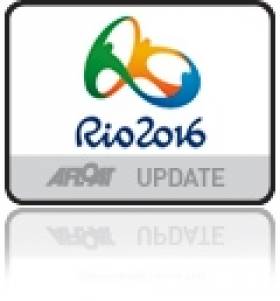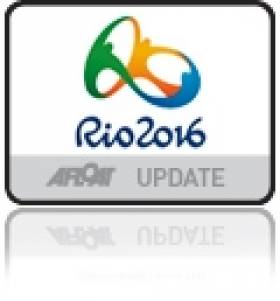Displaying items by tag: Paralympics
One Race Left to Sail For Twomey At Rio Paralympic Regatta
Kinsale's John Twomey, Ian Costelloe and Austin O'Carroll in the Sonar keelboat yesterday counted a DSQ and two 12th places to lie 13th overall with one race left to sail of the Paralympic Regatta in Rio today. Full results are here.
Australian's Colin Harrison, Russell Boaden and Jonathan Harris were next in line to secure another Australian gold ahead of the final race.
Yet again consistency was the key as a second place gave the Aussies a strong advantage going in to race ten. All they had to do was finish in the top 11 places for the race and the gold was theirs. They won the race just to put the shine on it.
Fresh off the water Harrison said, "It's just elation. It's been a long time coming and it feels great to get there. I don't know yet, still trying to work it out, I can't describe it. There's a lot of emotion.”
Harrison couldn't quite find the words to describe the win, but he found some when it came to why the whole Australian Sailing Team have been doing so well, "I think we have just got the best work ethic, culture, support and everything going on in the background is all about achieving success. That's what we felt over the years and that's why we are here today, without a doubt.”
For Harris a particular example of this support came to mind, "Going to Miami [USA] earlier on this year was a really important regatta, getting to sail against the Americans and Canadians there. We couldn't afford to go but the team got behind us and somehow the money appeared and we got some tickets and accommodation and we were there. Things like that have helped all the way through.”
Being consistent at Rio 2016 was no fluke for the Australian Sonar team. They have been consistent all year, and longer, leading up to the Paralympic Games, but it has always been that little bit out of reach for them, until now, "What's been frustrating is, in the last three years, we've always been on the podium but always a point or two away and it's been frustrating but you know what?” asks Harris, "This is the one that obliterates all those memories. Being the last Paralympics for sailing, it's a good one to have won.”
The Australian win was largely helped by their nearest rivals at the start of the day, USA, faltering. Current world champions Alphonsus Doerr, Hugh Freund and Bradley Kendell were within reach of the gold at the beginning of play, but with a disappointing eighth and discarded tenth they fell too far back to challenge for the top step on the podium.
The Americans hold on to second with 43 points, but their North American neighbours and training partner, Canada, are just one point behind on 44. Paul Tingley, Logan Campbell and Scott Lutes finished the day with a seventh and a second in the final race of the day.
In fourth place on the leaderboard with 48 points are London 2012 bronze medallists, Norway. Greece and New Zealand are next on 49 points, just one point ahead of Germany on 50.
There is still all to play for in the Sonar for silver and bronze Paralympic medals.
Sixth Place for O'Leary in Paralympic Canoe Final
#Canoeing: Patrick O’Leary finished sixth in the Final of the KL3 200 metre sprint event at the Paralympic Games in Rio de Janeiro today. The Corkman started quite well, but Ukraine, Germany and Brazil set the pace at the head of the field and took gold, silver and bronze in that order in an extremely close finish - just over a third of a second covered all three. O’Leary was 2.973 seconds off the gold medal and .584 off the bronze. The Irish man placed ahead of competitors from France and New Zealand, who finished seventh and eighth.
Paralympic Games (Canoe Sprint; Irish interest)
Men
KL3 200m - Final: 1 Ukraine 39.810 seconds, 2 Germany 39.909, 3 Brazil 40.199; 6 Ireland (P O’Leary) 42.783.
O'Leary Through to Canoe Final at Paralympic Games
#Canoeing: Patrick O’Leary qualified for the Final at the Paralympic Games today. The Galway-based Corkman finished third in the semi-final of the KL3 200 metres. The top four made it through. Britain’s Rob Oliver and Martin Farineaux of France took the top two places and New Zealand’s Scott Martlew was fourth.
O’Leary, who is an amputee, is coached by Neil Fleming. This is the first time the sport has been part of the Paralympic Games.
Paralympic Games (Canoe Sprint; Irish interest)
Men
KL3 200m - Heat Two (First Two Direct to Final; rest to Semi-Final): 1 Brazil 43.033, 2 Ukraine 45.239; 3 Ireland (P O’Leary) 45.977, 4 New Zealand 46.024, 5 France 46.577. Semi-Final (First Four to Final): 1 Britain 42.852, 2 France 43.572, 3 O’Leary 44.135, 4 New Zealand 44.284; 5 Poland 45.189, 6 Australia 45.258.
Canoeist O'Leary One Place Off Direct Qualification in Rio
#Canoeing: Ireland’s Patrick O’Leary finished third in his heat and will compete in the semi-finals of the KL3 canoe sprint event at the Paralympic Games in Rio de Janeiro. Brazil won, with Ukraine second. The top two qualified directly for the finals: O’Leary was .738 seconds off the second qualifying place.
Paralympic Games (Canoe Sprint; Irish interest)
Men
KL3 Heat Two (First Two Direct to Final; rest to Semi-Final): 1 Brazil 43.033, 2 Ukraine 45.239; 3 Ireland (P O’Leary) 45.977, 4 New Zealand 46.024, 5 France 46.577.
Doherty Pulls Out of C Final at Paralympic Qualification Regatta
#Rowing: Pararower Karol Doherty qualified for the C Final at the Paralympic Qualification Regatta in Gavirate in Italy, put was forced to pull out due to illness. The Derry man finished fifth in his heat and fifth in repechage. Just the top two in the A Final will qualify for the Paralympic Games in September in Rio de Janeiro.
Good news for the Ireland paralympic team is that the classification for Catherine McKeon has been completed.
The Irish Paralympic Sailing Team as part of their program to create awareness of The Rio 2016 Paralympic Games, and of the opportunities for all disabled persons to participate in sport are running a second Level Schools Competition.
The Irish Paralympic Sailing Team is made up of three members. John Twomey (Cork), who is the only man in the world to be competing in his 11th consecutive Paralympic Games. Ian Costelloe (Kerry), who will be attending his second Paralympic Games and Austin O Carroll (Dublin) who will be attending his first.
The Paralympic sailors are asking second level students to design a logo and campaign slogan for the Team and their boat. The prize for the student will be a team jacket. In addition to this the winning logo, slogan and the School’s name will be on the boat for the campaign and the Paralympic Games. Also there would be an opportunity for the student and two friends to sail with the Paralympic sailing team.
The Team are also encouraging schools to run a Casual Dress Day as a fundraiser for the Team. “We are also hoping that schools would host a casual dress day to raise awareness of the competition and funds for the Irish Paralympic sailing campaign. If the school would like a member of the team to come and address the students about what it takes to represent your country in the Paralympics then we would be delighted to provide the same.
The closing date for the competition is the 26th of February 2016 as the events that lead up to the Paralympic Games commence then and the team would like the logo and campaign slogan to be promoted for the student and the school at these events.
See details attached below.
Twomey & Crew Qualify for Rio Paralympics
John Twomey will race in a record 11th Paralympic Games following his qualification for the Rio Games at today's World Para Sailing Championships in Melbourne.
Twomey, Ian Costello and Austin O'Carroll have qualified for the Paralympic Games in Rio next year with a day to spare. The Sonar keelboat trio following an 11th and 12th place finish on the penultimate day of the Para World Sailing Championships in Melbourne and immediately booked their berth in Rio. They currently lie 9th overall at the Melbourne Championships.
Twomey said: 'We look forward to receiving coaching support from the Irish Sports Council and the ISA towards our bid to get on the podium in Rio. We have achieved what we came to Melbourne for which is qualification for Rio 2016. We still have a lot of hard work to do starting with the final race of this regatta tomorrow'
On the Sonar course today, the usually consistent Australian crew of Colin Harrison, Russell Boaden and Jonathan Harris really struggled to find any rhythm. They experienced problems yesterday, which were mainly due to really tough weather conditions and huge swings in wind direction. Today's racing was in stronger breeze, with lesser swings, but particularly in the second race, big seas were challenging for all crews on the windward legs. The Australians were 13th in race 9, their worst result so far, and 10th in race 10.
If conditions were hard, it certainly did not worry the British crew of John Robertson, Hannah Stodel and Steve Thomas, who came away with second and third places from today's races to lead on the points score table with 31 points. With their worrying day today, the Australian crew loses its place at the head of the leader board but remains in a podium position with French team of Bruno Jourdren, Eric Flageul and Nicolas Vimont-Vicary.
"We struggled for boat speed all day today,” said Australian skipper Colin Harrison, "Boats that were behind us at the start were beating us to the windward mark.” Coach Grant Alderson will be trying to return his team to the routines that brought them success in the early part of the regatta.
John Twomey Resigns As Head of Disabled Sailing's Governing Body
#IFDS - Ten-time Irish Paralympian John Twomey has resigned as president of the International Association for Disabled Sailing (IFDS), as Olympics news site Inside The Games reports.
Afloat's Sailor of the Month for August 2013 departs from his role after sailing's axing from the Tokyo 2020 Paralympics was confirmed after a review by the ISAF.
Though the ISAF, with which the IFDS merged last year, says it "will continue to work hard to reinstate sailing" in future Paralympics, that charge will now be headed by Twomey's interim replacement Bernard Destrubé – who paid tribute to the Kinsale sailor's leadership during a tumultuous time for the parasport.
Inside The Games has more on the story HERE.
#Paralympics - The decision to drop sailing from the 2020 Paralympic Games still stands, following a review of the organisers' controversial move by the ISAF Executive.
Sailing joined seven-a-side football on the chopping block when the International Paralympic Committee (IPC) announced its list of 22 sports for the Tokyo Paralympic Games in five years' time.
It means that next year's Paralympic Games in Rio will be the last time sailors take part for the foreseeable future.
The Irish Sailing Association (ISA) expressed its disappointment with the move "at a time when the development of Sailablity Ireland is more active than ever before."
Indeed, Ireland has been at the forefront of disabled sailing, with multiple-time Paralympian John Twomey holding the presidency of the sport's world governing body, and Kinsale hosting the IFDS Paralympic Worlds in 2013.
There were hopes that the ISAF's review of the IPC's announcement would see the decision overturned - especially following the merger of the IFDS with the ISAF late last year.
But those appear to have been quashed with the conformation that the process to select sports for Tokyo 2020 has officially ended.
The ISAF says it "will continue to work hard to reinstate sailing in the 2024 Paralympic Games and also pursue the slimmest possibility of sailing being included at Tokyo 2020."
The ISAF website has more on the story HERE.
Ireland 'Disappointed' with Axing of Paralympic Sailing
#paralympicsailing – The Irish Sailing Association says it is 'disappointed' Paralympic Sailing has been axed from the 2020 Tokyo Games. The comment follows Afloat.ie's news report on Monday that the sport, which held its world championships in Kinsale in 2013, had been dropped from the Tokyo line–up.
The Irish Sailing Association say they are in communication with ISAF, IFDS, Paralympics Ireland and other Member National Authorities to assess the options.
'At a time when the development of Sailability Ireland is more active than ever before, it is disappointing news to find out that sailing has been dropped from the Paralympics 2020 due to not reaching the minimum criteria for inclusion in the Games as stated in the IPC handbook' the statement from the national governing body says.
Only individual sports and disciplines widely and regularly practised in a minimum of 32 countries and three IPC regions may be considered for inclusion in the Paralympic Games. Only team sports widely and regularly practised in a minimum of 24 countries and three (3) IPC regions will be considered for inclusion in the Paralympic Games.
Recent development has resulted in the regular addition of new countries to competitive sailing. The process of merging with ISAF (with a membership of 139 Member National Authorities) was completed in November of 2014, with the main aim of opening a whole new field for the development of disabled sailing. Through ISAF's development programmes, worldwide participation initiatives and event structure, the opportunities for disabled sailing are better than ever before.
Meanwhile, this morning's Irish Times newspaper reports a possible reprieve for paralympic sailing for the Tokyo 2020 Games could emerge next week when the report by the IPC governing board into the selection criteria is published.



























